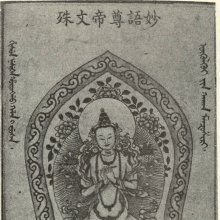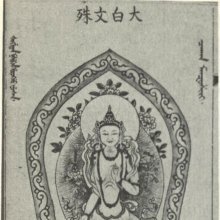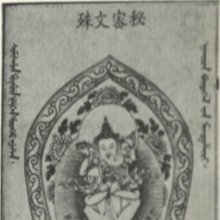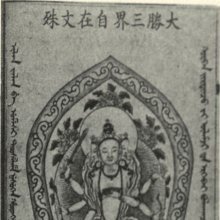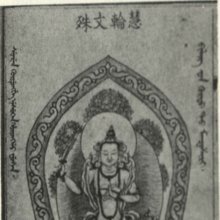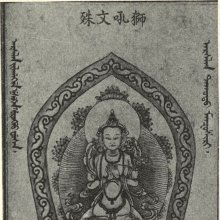Manjughosha, Mañjughoṣā, Mañjughoṣa, Manju-ghosha, Mamjughosha, Mamjughoshe: 13 definitions
Introduction:
Manjughosha means something in Buddhism, Pali, Hinduism, Sanskrit, Jainism, Prakrit. If you want to know the exact meaning, history, etymology or English translation of this term then check out the descriptions on this page. Add your comment or reference to a book if you want to contribute to this summary article.
The Sanskrit terms Mañjughoṣā and Mañjughoṣa can be transliterated into English as Manjughosa or Manjughosha, using the IAST transliteration scheme (?).
Images (photo gallery)
(+14 more images available)
In Hinduism
Purana and Itihasa (epic history)
Source: archive.org: Puranic EncyclopediaMañjughoṣā (मञ्जुघोषा).—A nymph. The sage Medhāvī cursed this nymph and made her into a devil. (See under Medhāvī).
Source: Cologne Digital Sanskrit Dictionaries: The Purana IndexMañjughoṣā (मञ्जुघोषा).—An Apsarasa.*
- * Brahmāṇḍa-purāṇa IV. 33. 19.

The Purana (पुराण, purāṇas) refers to Sanskrit literature preserving ancient India’s vast cultural history, including historical legends, religious ceremonies, various arts and sciences. The eighteen mahapuranas total over 400,000 shlokas (metrical couplets) and date to at least several centuries BCE.
In Buddhism
Tibetan Buddhism (Vajrayana or tantric Buddhism)
Source: archive.org: The Indian Buddhist Iconography1) Mañjughoṣa (मञ्जुघोष) is another name for Mañjuśrī: a Bodhisattva commonly depicted in Buddhist Iconography, and mentioned in the 11th-century Niṣpannayogāvalī of Mahāpaṇḍita Abhayākara.—Like Avalokiteśvara Mañjuśrī is worshipped in all Buddhist countries and has a variety of forms. Mañjuśrī has several names such as Mañjuvajra, Mañjughoṣa, Dharmadhātuvāgīśvara and so forth.
Manjusri as one of the eight Bodhisattvas is recognised by the favourite name of Mañjughoṣa (soft voice) and under this name he is described in the Lokanāthasādhana of the Sādhanamālā:—
“Mañjughoṣa is of golden colour and he holds in his two hands the sword and the book”
2) Mañjughoṣa (मञ्जुघोष) refers to one of the various forms of Mañjuśrī having their Sādhana described in the 5th-century Sādhanamālā (a collection of sādhana texts that contain detailed instructions for rituals).—His colour is golden-yellow; his Vahana is the lion; his Mudrā is the vyākhyāna; his Symbol is the lotus in the left.—
The Dhyāna (meditation instructions) of Mañjughoṣa is described in the Sādhanamālā as follows:
Source: OSU Press: Cakrasamvara Samadhi“The worshipper should meditate himself as the deity Mañjughoṣa who rides a lion, and is of golden yellow colour. He is decked in all ornaments, and his hands are engaged in forming the Vyākhyāna (teaching) mudrā. He displays the night lotus in his left, and bears the image of Akṣobhya on his crown. On his right there is Sudhanakumāra and on the left Yamāntaka ... The Mantra Oṃ Vāgīśvara Mūḥ should be muttered”.
Mañjughoṣa (मञ्जुघोष) is the name of a deity [i.e., oṃ mañjughoṣāya svāhā], according to the Guru Mandala Worship (maṇḍalārcana) ritual often performed in combination with the Cakrasaṃvara Samādhi, which refers to the primary pūjā and sādhanā practice of Newah Mahāyāna-Vajrayāna Buddhists in Nepal.—

Tibetan Buddhism includes schools such as Nyingma, Kadampa, Kagyu and Gelug. Their primary canon of literature is divided in two broad categories: The Kangyur, which consists of Buddha’s words, and the Tengyur, which includes commentaries from various sources. Esotericism and tantra techniques (vajrayāna) are collected indepently.
In Jainism
General definition (in Jainism)
Source: archive.org: Trisastisalakapurusacaritra1) Mañjughoṣā (मञ्जुघोषा) is the name of an Apsaras, instructed by Śakra to help in the preparations of Ṛṣabha’s wedding-preparations, according to chapter 1.2 [ādīśvara-caritra] of Hemacandra’s 11th century Triṣaṣṭiśalākāpuruṣacaritra: an ancient Sanskrit epic poem narrating the history and legends of sixty-three illustrious persons in Jainism.
Accordingly, “[...] Then having ascertained the Lord’s purpose, Purandara at once summoned gods for the tasks of the wedding-preparations.—‘[...] Mañjughoṣā, have women-friends sing sweetly auspicious songs; Sugandhā, prepare the perfumes. Tilottamā put the best svastikas on the door. [...]’. From the bustling of the Apsarases instructing each other in this way, and frequently calling names, a mighty tumult arose”.
2) Mañjughoṣā (मञ्जुघोषा) is the name of a bell, according to chapter 2.2.—Accordingly: “[...] then the bells, [i.e., Mañjughoṣā], belonging respectively to the Nagas, etc., of the two divisions of the Bhavanapatis, rang, struck three times by generals named Bhadrasena belonging to Dharaṇa, etc., and by those named Dakṣa belonging to Bhūtānanda, etc. Then all the Nāgas, etc., of the two rows came instantly each to his own Indra, like horses to their own stables. At their command their respective Ābhiyogika-gods created at once cars variegated with jewels and gold, twenty-five thousand yojanas square, with indradhvajas of two hundred and fifty yojanas. [...]”.

Jainism is an Indian religion of Dharma whose doctrine revolves around harmlessness (ahimsa) towards every living being. The two major branches (Digambara and Svetambara) of Jainism stimulate self-control (or, shramana, ‘self-reliance’) and spiritual development through a path of peace for the soul to progess to the ultimate goal.
Languages of India and abroad
Sanskrit dictionary
Source: DDSA: The practical Sanskrit-English dictionaryMañjughoṣa (मञ्जुघोष).—a. uttering a sweet sound.
-ṣaḥ a dove.
Mañjughoṣa is a Sanskrit compound consisting of the terms mañju and ghoṣa (घोष).
Source: Cologne Digital Sanskrit Dictionaries: Edgerton Buddhist Hybrid Sanskrit DictionaryMañjughoṣa (मञ्जुघोष) or Mañjuśrī.—q.v.; usually in verses: Saddharmapuṇḍarīka 10.7; 14.7; 296.1; Sādhanamālā 49.15 etc.; Gaṇḍavyūha 489.10; (Ārya-)Mañjuśrīmūlakalpa 32.18; 65.22; 69.27 etc. (all these verses).
Source: Cologne Digital Sanskrit Dictionaries: Shabda-Sagara Sanskrit-English DictionaryMañjughoṣa (मञ्जुघोष).—mfn.
(-ṣaḥ-ṣā-ṣaṃ) Having a sweet voice or cry. m.
(-ṣaḥ) One of the Baudd'ha teachers. f.
(-ṣā) One of the Apsaras or courtezans of Swarga. E. mañju agreeable, and ghoṣa sound, voice.
Source: Cologne Digital Sanskrit Dictionaries: Monier-Williams Sanskrit-English Dictionary1) Mañjughoṣa (मञ्जुघोष):—[=mañju-ghoṣa] [from mañju > mañj] mfn. uttering a sweet sound, [Bhāgavata-purāṇa]
2) [v.s. ...] m. a dove, [cf. Lexicographers, esp. such as amarasiṃha, halāyudha, hemacandra, etc.]
3) [v.s. ...] = -śrt, [Saddharma-puṇḍarīka]
4) Mañjughoṣā (मञ्जुघोषा):—[=mañju-ghoṣā] [from mañju-ghoṣa > mañju > mañj] f. Name of an Apsaras, [cf. Lexicographers, esp. such as amarasiṃha, halāyudha, hemacandra, etc.]
5) [v.s. ...] of a Surāṅganā, [Siṃhāsana-dvātriṃśikā or vikramāditya-caritra, jaina recension]
Source: Cologne Digital Sanskrit Dictionaries: Yates Sanskrit-English DictionaryMañjughoṣa (मञ्जुघोष):—[mañju-ghoṣa] (ṣaḥ) 1. m. Jaina sage. f. (ṣā) An An Apsara or nymph. a. Having a sweet soft melodious voice.
[Sanskrit to German]
Sanskrit, also spelled संस्कृतम् (saṃskṛtam), is an ancient language of India commonly seen as the grandmother of the Indo-European language family (even English!). Closely allied with Prakrit and Pali, Sanskrit is more exhaustive in both grammar and terms and has the most extensive collection of literature in the world, greatly surpassing its sister-languages Greek and Latin.
Kannada-English dictionary
Source: Alar: Kannada-English corpusMaṃjughōṣa (ಮಂಜುಘೋಷ):—[noun] a pleasing sound, speech or announcement.
--- OR ---
Maṃjughōṣe (ಮಂಜುಘೋಷೆ):—[noun] a woman having pleasing speech.
Kannada is a Dravidian language (as opposed to the Indo-European language family) mainly spoken in the southwestern region of India.
See also (Relevant definitions)
Partial matches: Ghosha, Manju, Mancu.
Full-text (+9): Dhiyampati, Vadiraj, Balavrata, Vagishvara, Pancacira, Manjushri, Manjubhadra, Simhakeli, Manjusvara, Purbbajina, Dakshinamnaya, Parahitodyata, Padmapani, Vishkambhin, Parahita, Apratirupa, Udyata, Maitreyatmaka, Yakshadhipa, Khadgin.
Relevant text
Search found 19 books and stories containing Manjughosha, Maṃjughōṣa, Mamjughosa, Maṃjughōṣe, Mamjughose, Mamjughosha, Mamjughoshe, Mañju-ghoṣa, Manju-ghosa, Mañju-ghoṣā, Manju-ghōṣa, Manju-ghosha, Mañjughoṣā, Manjughosa, Mañjughoṣa, Mañjughōṣa, Manjughōṣa, Mañjughōṣe, Manjughose, Manjughoshe; (plurals include: Manjughoshas, Maṃjughōṣas, Mamjughosas, Maṃjughōṣes, Mamjughoses, Mamjughoshas, Mamjughoshes, ghoṣas, ghosas, ghoṣās, ghōṣas, ghoshas, Mañjughoṣās, Manjughosas, Mañjughoṣas, Mañjughōṣas, Manjughōṣas, Mañjughōṣes, Manjughoses, Manjughoshes). You can also click to the full overview containing English textual excerpts. Below are direct links for the most relevant articles:
Puranic encyclopaedia (by Vettam Mani)
The Padma Purana (by N.A. Deshpande)
Chapter 46 - Pāpamocanī Ekādaśī < [Section 6 - Uttara-Khaṇḍa (Concluding Section)]
Chapter 8 - Conditions During Jālandhara’s Rule < [Section 6 - Uttara-Khaṇḍa (Concluding Section)]
Sripura (Archaeological Survey) (by Bikash Chandra Pradhan)
Scultures of Manjughosa < [Chapter 3 - Sculptural Programme]
Scultures of Bodhisattvas < [Chapter 3 - Sculptural Programme]
Scultures of Aksobhya < [Chapter 3 - Sculptural Programme]
Stupas in Orissa (Study) (by Meenakshi Chauley)
The gods of northern Buddhism (by Alice Getty)
Bodhicaryāvatāra (by Śāntideva)
Related products
